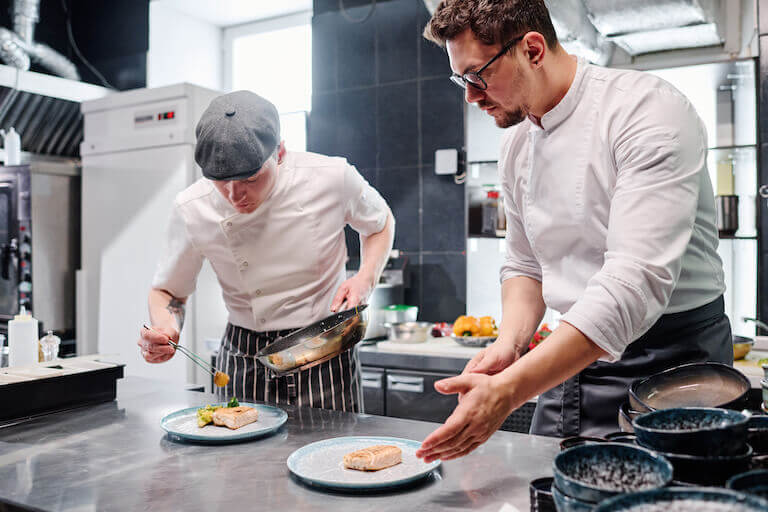Listen to This Article:
So you’ve got your heart set on being an executive chef. But you know there will be several stops along the way that may prepare you for the role of head chef. One of those landmark roles in the brigade de cuisine is the sous chef.
Understanding what it takes to become a great sous chef can help you build a thriving career in the culinary arts. If you aspire to be an executive chef commanding a team in your own kitchen, this knowledge might be crucial!
What Is a Sous Chef?
The word “sous” is French for “under” and “chef” originally translates as “chief”—so a sous chef is second-in-command to the executive chef. Large hotels, convention centers, and high-volume restaurants may have many sous chefs, whereas smaller restaurants would usually have one kitchen lead and one sous chef operating between that lead and the rest of the staff.
The brigade de cuisine is a hierarchical system that was originally invented by Georges Auguste Escoffier and it involves collaboration between many moving parts. The sous chef de cuisine is essentially the second most important job in the kitchen.
The Kitchen Hierarchy
- Executive Chef: In charge of the entire kitchen and may oversee a few restaurants
- Sous Chef: Under the executive chef and manages all kitchen staff, as well as kitchen operations
- Garde Manger: Prepares chilled dishes like hors d’oeuvres, salads, and charcuterie boards
- Patissier: Creates the dessert menu and oversees the development of sweet menu items
- Saucier: Responsible for the creation of all sauces, including soups and stews
- Commis Chef (Line Cook): Performs a bulk of the cooking at a select station in the kitchen
- Prep Cooks: Responsible for “prep” work like peeling and chopping vegetables
What Does a Sous Chef Do?
Sous chefs are called upon to support executive chefs and represent them in their absence. They must be able to think on their feet, make sound snap decisions, and come up with creative concepts for the restaurant. Other daily responsibilities may include:
- Training: The sous chef often is the one responsible for training new staff members and managing the team.
- Scheduling: A sous chef may create schedules for the entire kitchen staff, as well as oversee payroll.
- Safety: Most sous chefs might also mandate safety regulations and monitor sanitation practices.
- Inventory: Sous chefs may also track and order inventory, as well as ensure the kitchen staff has what they need in terms of tools and supplies to seamlessly deliver a finished product.
- Menu and Recipe Development: Many sous chefs might also assist the executive chef with menu design and the strategic selection of key ingredients.
Sous Chef Job Requirements
With the level of responsibility and ongoing personal growth required from a sous chef, one can certainly benefit from an intrinsic passion for the work. Along with this affinity, here are some additional requirements that might be necessary to step into a sous chef position.
Obtain a Culinary Arts Education
Although this may not be mandatory, many sous chef positions may require some sort of formal culinary education. Students enrolled in culinary school at Escoffier build practical skills in the kitchen by diving into foundational concepts sous chefs may need to know.
These concepts can include:
- Food service management
- Menu planning
- Culinary math
- Business development
This type of thorough training, along with working up the kitchen hierarchy, could increase your chances of getting hired or securing a position at a restaurant or foodservice establishment.
Gain Credibility Through Entry-Level Positions
As we hinted at towards the beginning, a sous chef isn’t an entry-level position by any means, so it’s quite rare to secure this position right out of culinary school. Most sous chefs have worked their way up the kitchen ladder, starting in more entry-level positions such as prep or line cook. These jobs can provide chefs with the foundational understanding of how to mandate every station in the kitchen…naturally building credibility. This type of experience can prepare you to step into the “hallmark” role of a sous chef in just a few years.
Continue to Practice Hard Work
Many sous chefs will put in long hours—possibly even 12-hour shifts—to get the job done while continuing to gain experience under the senior executive chef. The position can be viewed as a stepping stone to rising to the top. Sous chefs who exude discipline and the right skill set can be promoted to an executive chef position.
A Day in the Life of a Sous Chef
As you can see, a day in the life of a sous chef is filled with variety and hands-on involvement in every aspect of the kitchen. Typically, a sous chef’s day may begin early in the morning with a review of the menu for the day to ensure all ingredients are prepared. They check inventory, place orders, and coordinate with the executive chef to finalize the plan for service.
During the day, the sous chef oversees prep work, keeps stations fully stocked, and assists line cooks if necessary. They may take time to train new staff and ensure that kitchen standards and safety protocols are being followed. They stay busy, always looking for ways to keep the kitchen running smoothly.
Once the last order has been filled and the kitchen is closed, the sous chef’s job is not over. They ensure the kitchen is properly cleaned, inventory is checked, and everything is ready for the upcoming day.
What Makes a Good Sous Chef?
This role requires a range of skills as well as a specific, goal-oriented mindset. Here’s a rundown of the competencies you may need to develop.

A sous chef can be vital to the success of a kitchen
Cooking Skills
It seems obvious, right? But an effective sous chef needs an exceptional level of cooking prowess. They must be prepared to jump into any part of the line, for any reason—when the line is missing a cook or to speed up the line when meal service peaks, for example.
A sous chef can have the skills to execute a wide range of dishes—from salads to complex entrees, using a variety of culinary techniques in rapid succession.
Organizational Skills
A good sous chef must be extremely organized, because their tasks may vary, day-to-day. They could include things like assisting the executive chef with meal planning, keeping tabs on kitchen supplies and ingredients when it comes time to prepare the meals, making sure the kitchen is up to sanitation standards in time for daily service, and much more.
Logistics are part of the sous chef’s job as well. Scheduling the other kitchen staff and making sure they arrive on time, as well as filling in personally if someone calls in sick or is late, all fall under the umbrella of the sous chef role.
The sous chef must be quick-thinking, adaptable, and calm under pressure. They’re often responsible for making changes on the fly when certain supplies or staff are unavailable. As the link between the lead chef and the team, the sous chef plays a vital role in the kitchen.
Leadership and Communication Skills
These skills go hand-in-hand. While the executive chef is technically in charge of the kitchen, it’s often the sous chef who performs much of the hands-on management. Ideally, a sous chef will be able to train and supervise the kitchen staff and then help them carry out the executive chef’s intentions for cooking and plating the meal.
The sous chef must project confidence and an air of authority required to manage staff in an often busy, loud, and stressful environment. Keeping the entire team working towards a common goal is a big, yet rewarding undertaking. It requires clear communication and an ability to motivate everyone, all while performing their own tasks as a professional cook on the line.
A successful sous chef can juggle all of these demands, even when the team is feeling overworked and stressed.
Reliability
This can be the essential foundation of a successful working relationship between the executive chef and the sous chef. For any kitchen to succeed, the sous chef must demonstrate competence and reliability. Arriving early, staying late, and completing tasks ahead of schedule are actions that can set a sous chef apart.
As a sous chef, you may be expected to work up to 12 hours a day. But for many, this level of dedication to the craft is worth it. There is the satisfaction that comes from earning the trust and support of your lead chef, the respect of your coworkers, and being part of a successful restaurant. The sous chef can gain critical acclaim when the executive chef or the restaurant does, and they can also more easily advance to the head of the brigade should the executive chef decide to leave.

Sous chefs should be ready to delegate kitchen tasks and execute the restaurant menu.
Embarking on the Journey to Sous Chef
Exploring how to become a good sous chef takes unwavering dedication and perseverance but is a very rewarding career if you have the passion and drive. The position offers the chance to learn, grow, and potentially lead a kitchen as an executive chef in the future. For those willing to put in the hard work and time, the rewards can include respect, recognition, and achieving your culinary goals.
Think you have what it takes to pursue a culinary career? Talk to us about Escoffier’s academic, financing, and career plans.
ENJOYED THIS ARTICLE? HERE ARE THREE MORE TO HELP YOU:
- Is Being a Chef a Good Career Choice?
- The Difference Between a Cook and a Chef
- What Are the Different Chef Certifications?
This article was originally published on December 3, 2015, and has since been updated.


